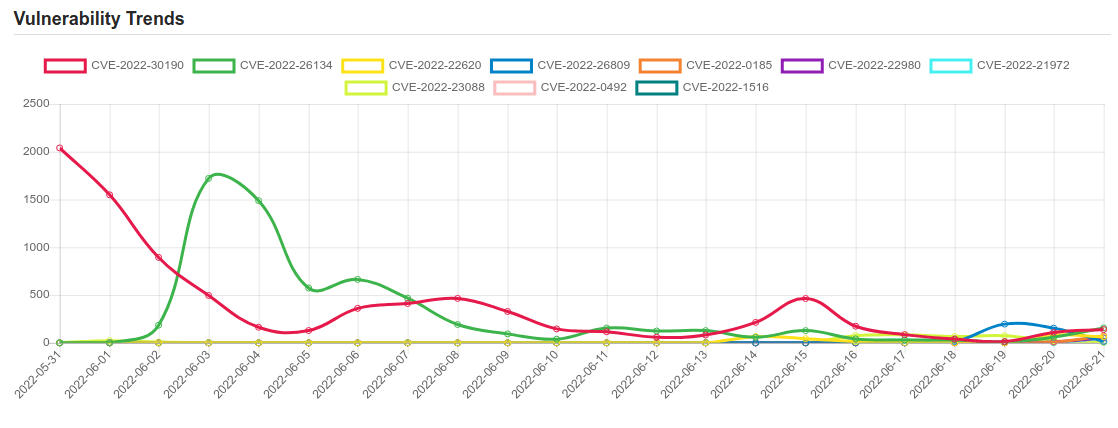Daily Vulnerability Trends: Wed Jun 22 2022

| CVE NAME | CVE Description |
| CVE-2022-27511 | Corruption of the system by a remote, unauthenticated user. The impact of this can include the reset of the administrator password at the next device reboot, allowing an attacker with ssh access to connect with the default administrator credentials after the device has rebooted. |
| CVE-2022-27512 | Temporary disruption of the ADM license service. The impact of this includes preventing new licenses from being issued or renewed by Citrix ADM. |
| CVE-2022-21662 | WordPress is a free and open-source content management system written in PHP and paired with a MariaDB database. Low-privileged authenticated users (like author) in WordPress core are able to execute JavaScript/perform stored XSS attack, which can affect high-privileged users. This has been patched in WordPress version 5.8.3. Older affected versions are also fixed via security release, that go back till 3.7.37. We strongly recommend that you keep auto-updates enabled. There are no known workarounds for this issue. |
| CVE-2022-30136 | Windows Network File System Remote Code Execution Vulnerability. |
| CVE-2022-25845 | The package com.alibaba:fastjson before 1.2.83 are vulnerable to Deserialization of Untrusted Data by bypassing the default autoType shutdown restrictions, which is possible under certain conditions. Exploiting this vulnerability allows attacking remote servers. Workaround: If upgrading is not possible, you can enable [safeMode](https://github.com/alibaba/fastjson/wiki/fastjson_safemode). |
| CVE-2022-31062 | ### Impact A plugin public script can be used to read content of system files. ### Patches Upgrade to version 1.0.2. ### Workarounds `b/deploy/index.php` file can be deleted if deploy feature is not used. |
| CVE-2022-30190 | Microsoft Windows Support Diagnostic Tool (MSDT) Remote Code Execution Vulnerability. |
| CVE-2022-26134 | In affected versions of Confluence Server and Data Center, an OGNL injection vulnerability exists that would allow an unauthenticated attacker to execute arbitrary code on a Confluence Server or Data Center instance. The affected versions are from 1.3.0 before 7.4.17, from 7.13.0 before 7.13.7, from 7.14.0 before 7.14.3, from 7.15.0 before 7.15.2, from 7.16.0 before 7.16.4, from 7.17.0 before 7.17.4, and from 7.18.0 before 7.18.1. |
| CVE-2022-22620 | A use after free issue was addressed with improved memory management. This issue is fixed in macOS Monterey 12.2.1, iOS 15.3.1 and iPadOS 15.3.1, Safari 15.3 (v. 16612.4.9.1.8 and 15612.4.9.1.8). Processing maliciously crafted web content may lead to arbitrary code execution. Apple is aware of a report that this issue may have been actively exploited.. |
| CVE-2022-26809 | Remote Procedure Call Runtime Remote Code Execution Vulnerability. This CVE ID is unique from CVE-2022-24492, CVE-2022-24528. |
| CVE-2022-0185 | A heap-based buffer overflow flaw was found in the way the legacy_parse_param function in the Filesystem Context functionality of the Linux kernel verified the supplied parameters length. An unprivileged (in case of unprivileged user namespaces enabled, otherwise needs namespaced CAP_SYS_ADMIN privilege) local user able to open a filesystem that does not support the Filesystem Context API (and thus fallbacks to legacy handling) could use this flaw to escalate their privileges on the system. |
| CVE-2022-22980 | No description provided |
| CVE-2022-21972 | Point-to-Point Tunneling Protocol Remote Code Execution Vulnerability. This CVE ID is unique from CVE-2022-23270. |
| CVE-2022-23088 | No description provided |
| CVE-2022-0492 | A vulnerability was found in the Linux kernel’s cgroup_release_agent_write in the kernel/cgroup/cgroup-v1.c function. This flaw, under certain circumstances, allows the use of the cgroups v1 release_agent feature to escalate privileges and bypass the namespace isolation unexpectedly. |
| CVE-2022-1516 | A NULL pointer dereference flaw was found in the Linux kernel’s X.25 set of standardized network protocols functionality in the way a user terminates their session using a simulated Ethernet card and continued usage of this connection. This flaw allows a local user to crash the system. |
| CVE-2022-1040 | An authentication bypass vulnerability in the User Portal and Webadmin allows a remote attacker to execute code in Sophos Firewall version v18.5 MR3 and older. |
| CVE-2022-26937 | Windows Network File System Remote Code Execution Vulnerability. |
| CVE-2022-22057 | Use after free in graphics fence due to a race condition while closing fence file descriptor and destroy graphics timeline simultaneously in Snapdragon Auto, Snapdragon Compute, Snapdragon Connectivity, Snapdragon Industrial IOT, Snapdragon Mobile, Snapdragon Wearables |
| CVE-2022-2068 | Cisco IOS XE Wireless Controller Software for the Catalyst 9000 Family denial of service | CVE-2022-20682 |
If you like the site, please consider joining the telegram channel and supporting us on Patreon using the button below.


![Cobalt Strike Beacon Detected - 179[.]43[.]186[.]234:80 3 Cobalt-Strike](https://www.redpacketsecurity.com/wp-content/uploads/2021/11/Cobalt-Strike-300x201.jpg)
![[PLAY] - Ransomware Victim: All Book Covers 4 image](https://www.redpacketsecurity.com/wp-content/uploads/2024/09/image-300x300.png)